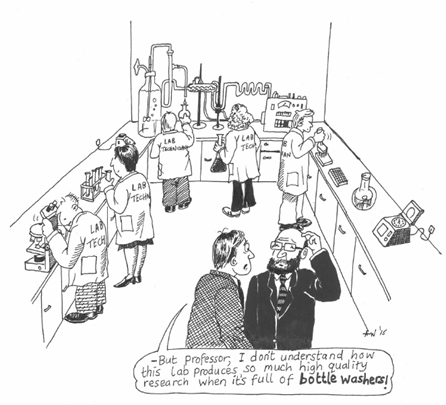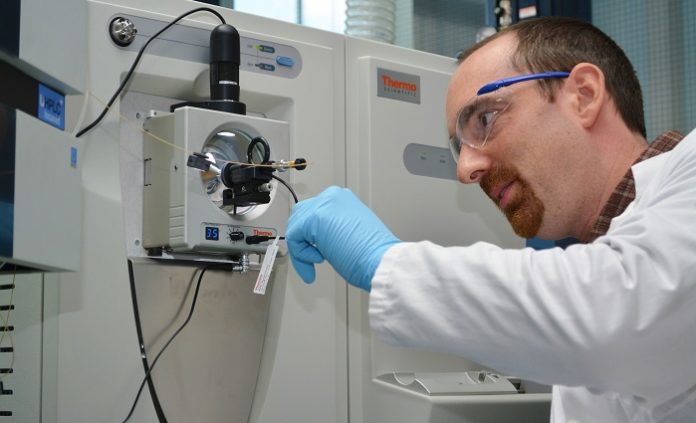The failure to value technician’s role in universities is leading to poor decision making and often expensive investment mistakes, warns Terry Croft. In this blogpost, he highlights what the University of Sheffield is doing to improve the situation by delivering the national HEFCE Catalyst project.
We are facing a technician shaped hole in higher education (HE). Technical staff are vital to the daily running of universities, essential for both research and teaching. However, HEFCE data shows that 40% of technicians in HE are aged 50 and over, meaning that many highly skilled technicians will soon be lost due to retirement.
A lack of an effective workforce and succession planning, along with challenges recruiting skilled staff, and in some cases retaining them, means that we are facing a situation whereby we will lose skilled technicians at a much faster rate than we are able to replace them.
Mind the technical skills gap
We also know that there is expected to be a shortage of skilled technical staff across all sectors. Recent research by Gatsby shows that the UK will need as many as 700,000 new technicians across all sectors in the next decade. This leaves HE institutions with a significant challenge.
But what does a technician do?
The role of the technician, particularly in universities, is poorly understood. The significant contributions they make to teaching and research are often not recognised, nor acknowledged and their high level skill sets are not valued.

For example, some universities invest in the latest high tech, expensive equipment without including technicians in the planning. This means there’s no agenda for identifying the key technical staff that will ultimately operate and maintain this new kit. Indeed, there have been entire strategic planning documents where the word technician isn’t even mentioned.
One recent example resulted in a mass spec facility having to be left idle following the departure of their chief technician. He had informed his head of department that he was definitely retiring in two years and kept highlighting this issue over the subsequent years. With a few months left before his departure the position was advertised externally with poor results. There had been no succession planning, no thought of up skilling less experienced mass spec technicians and no appreciation of the potential impact on business continuity. After all he was just a technician!
By recognising the major contribution the professional technician brings to an institution and engaging with them as professionals in their own right, then time, money and resources will be used more efficiently and an increase in value for money will be achieved.
Technicians have limited opportunity for development; complex structures and grading systems mean that possible career pathways are at best opaque. All of this leads to low morale. If you want to find out more about the issues facing the HE sector and the technical community please read the following HEFCE blog and this article in the Times Higher Education.
Having begun my career as a technician, and finding my own career pathway – no formal career pathways had been available – to become director of operations for a science faculty, these issues are something I have witnessed first hand. But now as director of the HEFCE Technical Development and Modernisation (TDM) project I am in a position to help address these issues and help institutions plug this hole.
A technical toolkit
So, what are we doing to help plug the gap?
In 2014, the University of Sheffield successfully secured £400,000 of HEFCE funding to develop a toolkit to pioneer career pathways, raise the profile of technicians and support ways of bringing new blood into the profession.
The TDM toolkit, currently under development will be rolled out to all HE institutions in England. The tools enable a more consistent approach to the strategic development of the technical workforce, and at the same time are designed to create clear career pathways for technician development. Our toolkit, developed in collaboration with project partners, aims to bring both a consistent approach and prevent each institution from having to reinvent the wheel.
- Technician career progression in HE is hindered by the lack of consistency in job titles and grades within and across institutions, so we are developing a HE technical taxonomy of roles a competency framework setting out key competencies for each role, and generic job descriptions.
- To allow HEIs to gain a better understanding of their technical workforce, and to support a strategic approach to workforce planning, we are creating a technical roles, responsibilities and skills capture survey. This will provide information on skills gaps to management as well as individual reports for technicians themselves.
- We will support institutions in the recruitment of trainees, interns and apprentices with our technician entry programme framework, a how-to guide giving practical advice on developing and running effective entry programmes.
- To address the fact that technicians have traditionally felt isolated and undervalued, we are developing tools to support career development such as mentoring and networking.
- To support continuing professional development (CPD) capture and E-learning for technical staff we are developing an open source CPD capture and e-learning tool (ASPIRE) to log professional development and manage training.
There is more information about the toolkit on our website.
How could we help each other?
We need to increase awareness of the technician shaped hole in HE and how the tools can be used to address this. If you would like to find out more about the TDM project then you can visit our website or email us at tdm@sheffield.ac.uk. If your institution is interested in understanding more about the project and wants to be ready to use the tools as they are released, then please get in touch.






